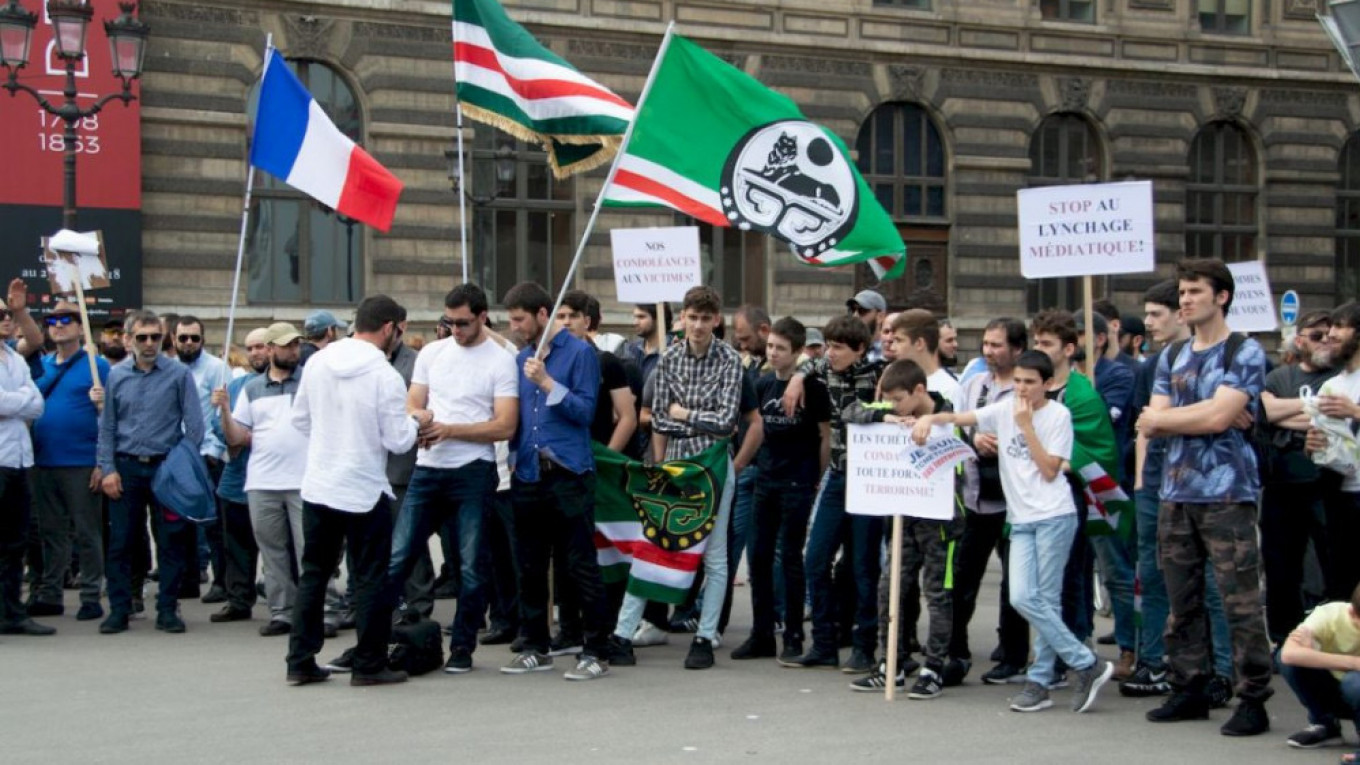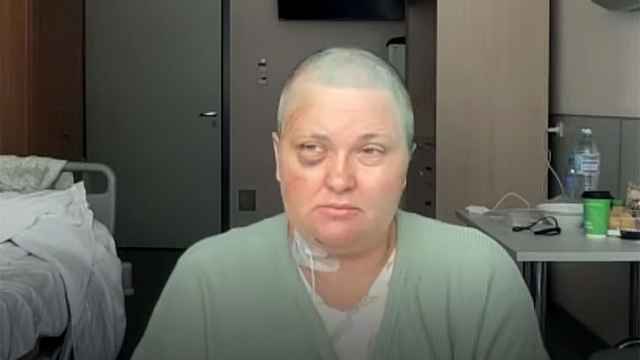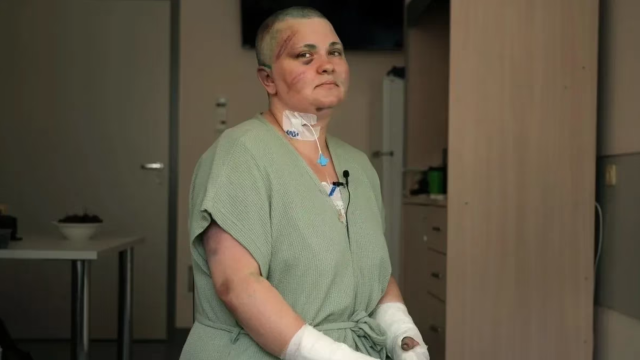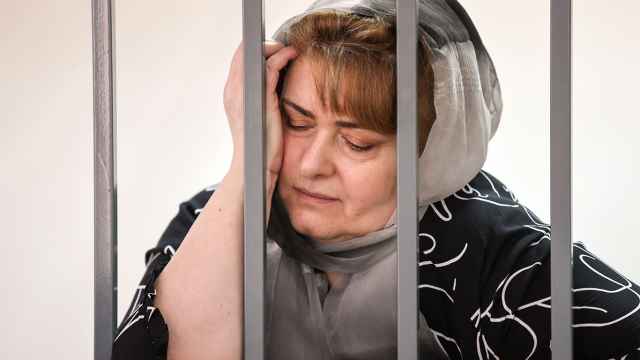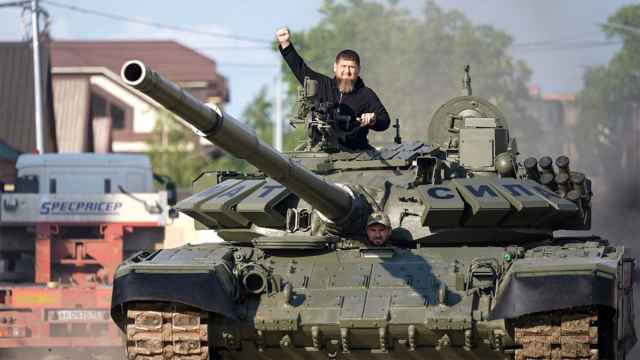Soon after news broke that a Chechen teenager was responsible for the gruesome daylight beheading of French teacher Samuel Paty, Parisian student Akhmat started to get texts from his friends asking him if he knew the killer.
“We are a relatively small group, so people just assumed we knew each other. It shows what an attack like this does to us,” Akhmat, 22, told The Moscow Times.
The murder that has sent shockwaves across France is forcing Chechens in the country to think about what it might mean for their tight-knit community, while diaspora leaders across Europe fear that the attack will lead to stigmatization, or worse, deportation back to Chechnya.
“Let me be clear, this attack is absolutely abhorrent and has no excuse. I was shocked to read it was one of our own. I thought it was a mistake,” said Suleimanov, founder of Paris-based Chechen diaspora organization Bart Marsho.
He highlighted a letter condemning the attack sent to French President Emmanuel Macron from Bart Marsho and The Assembly of Chechens of Europe hours after it became clear that 18-year-old Abdoullakh Anzorov had committed the horrific act because he was offended by the showing of cartoons of the Prophet Muhammad in class.
“Unfortunately, the impact of this could potentially be disastrous for us,” Suleimanov said.
Chechens came to France as political refugees in the early 2000s, fleeing from two successive wars between Islamic separatists and Russian troops in the North Caucasian Russian republic. Today, there are approximately 67,000 Chechens in France, making up the largest community among the Chechen diaspora in Europe. Most of them live in Paris and the south of France.
A new wave of Chechens has fled into exile in recent years over disagreements with Chechen strongman leader Ramzan Kadyrov, whose rule rights groups say has seen torture and killings, while some of the earlier Chechen immigrants fought against Kadyrov during the Second Chechen War.
“This makes it harder for Chechens to request political asylum in Europe in the long run,” said Zelimkhan Dokudaev, a Chechen who runs a cultural center that helps North Caucasian immigrants adapt to life in Germany. Dokudaev fears that Chechens across the board will now be treated with suspicion by immigration services.
“For many, going back to Chechnya is a death sentence,” Dokudaev said.
Two days after the killing of Paty, France announced it was preparing to expel 231 foreigners on a government watch list for suspected extremist religious believers. On Monday, French Interior Minister Gerald Darmanin said he was planning to visit Russia, along with Tunisia, Malta and Algeria to discuss security issues and the repatriation of “radical Islamists” from France.
"Russia is a country affected by this problem, there are individuals coming to France from Chechnya, which is part of Russia," Darmanin said.
It is unclear how many Chechens are on the French “extremism” security list. Bart Marsho’s Suleimanov estimates the number to be between 20 and 40.
Such numbers could prompt the largest expulsion of Chechens to Russia, said Yekaterina Sokirianskaya of the Conflict Analysis and Prevention Center, which specializes in the North Caucasus.
“Whoever is identified by the French as radicalized and sent back to Chechnya will very likely have a very tough time there,” she said.
Sokirianskaya said the expelled Chechens could face torture by Chechen security forces and be pressured to give information on other radicalized Chechens and anti-Kadyrov dissidents in Europe, given the negative sentiments many Chechens outside the region have toward Kadyrov.
Since the early 2010s, critics of Kadyrov have said he and his security forces have intensified attacks on opponents of his regime, allegations the strongman denies.
In August 2019, 40-year-old ethnic Chechen and Georgian national, Zelimkhan Khangoshvili, was shot dead in Berlin, while last February vocal Kadyrov critic and blogger Tumso Abdurakhmanov was attacked by a hammer-wielding assailant as he slept in his apartment in Sweden. His attacker on Tuesday hinted Kadyrov was behind the attack, when he told a Swedish court that his actions were “ordered by Grozny.” Abdurakhmanov had previously been denied asylum in Poland.
Kadyrov initially condemned the murder of Paty, but later added that Macron was “100 time worse than the Chechen attacker” for “inciting terrorism.”
Shortly after, prominent Dagestani MMA fighter Khabib Nurmagomedov joined the growing chorus of protests from prominent Russian Muslims against Macron’s defense of secular values.
“May God disfigure the face of this creature and all followers who offend the feelings of over 1.5 billion Muslim believers under the slogan of free speech,” Nurmagomedov wrote to his 25 million Instagram followers. Protestors also gathered outside the French embassy in Moscow to protest against Macron, burning portraits of the French president.
Sokritianaksaya believes this tension between Chechnya and France might, in the first instance, help any Chechens deported out of Europe.
“Kadyrov could characterize the expelled as victims of Western Islamophobia, but in the long term their prospects are still bleak,” she said.
Bad books
The Chechen community has not always been under the spotlight of the security services, said Nikolas Henin, a French consultant in counter-terrorism and counter-radicalization.
“The first generation of Chechens in France, especially, were not involved in any sort of domestic terrorism. They were in the good books of France’s antiterrorism organizations.”
The first sign that members of the community were being radicalized came in 2013, when two Chechen brothers organized the bombing of the Boston Marathon in the U.S.
After the outbreak of civil war in Syria in 2011, around 3,000 Chechen militants from Europe and Russia travelled to Syria to join Islamic forces and formed numerous anti-government militias, as many saw the hostility by the rebels toward the Assad government as an extension of the long Chechen–Russian conflict.
The first attack on European soil came in 2018, when a 21-year-old Chechen born French citizen, armed with a knife, killed a pedestrian in Paris in what security officials said was a terrorist attack.
This summer, ethnic clashes between Chechen, Middle Eastern and North African youths shook France’s eastern city of Dijon.
“Chechen’s are sadly losing their credit in French society,” Henin said, adding that he doesn’t expect France to start deporting Chechens without giving each case “proper consideration.”
Baskhan Magomadov, a Chechen Imam in Nice, rejected the idea that the Chechen community as a whole has a radicalization problem.
“What happened should be seen as a French problem, the boy lived most of his life in France. He radicalized here, through the Internet, not his family.”
French police have indicated that Anzorov’s family was not religious and have since released his brother and father.
Days after the attack, left-wing politician and leader of the La France Insoumise party Jean-Luc Mélenchon said “there is a very clear problem with the Chechen community in France, and called for the “expulsion” of Chechens who act on the ground of “Islamism policy.”
However, after widespread criticism Mélenchon apologised for his comment, a gesture Magomadov and other Chechens have seen as a positive sign that the French people are not going to scapegoat them.
While admitting that there has been discontent in the Chechen community about the cartoons and Macron’s statements, Magomadov emphasized that everyone who asks for asylum in France pledges to abide by local laws.
"This is a secular state, not a Muslim one. Caricatures are drawn here of all religions: Jesus, Moses, Muslims, Jews, Buddhists, Christians, Catholics. I call on our youth to be patient and not react to this," Magomadov said.
A Message from The Moscow Times:
Dear readers,
We are facing unprecedented challenges. Russia's Prosecutor General's Office has designated The Moscow Times as an "undesirable" organization, criminalizing our work and putting our staff at risk of prosecution. This follows our earlier unjust labeling as a "foreign agent."
These actions are direct attempts to silence independent journalism in Russia. The authorities claim our work "discredits the decisions of the Russian leadership." We see things differently: we strive to provide accurate, unbiased reporting on Russia.
We, the journalists of The Moscow Times, refuse to be silenced. But to continue our work, we need your help.
Your support, no matter how small, makes a world of difference. If you can, please support us monthly starting from just $2. It's quick to set up, and every contribution makes a significant impact.
By supporting The Moscow Times, you're defending open, independent journalism in the face of repression. Thank you for standing with us.
Remind me later.



